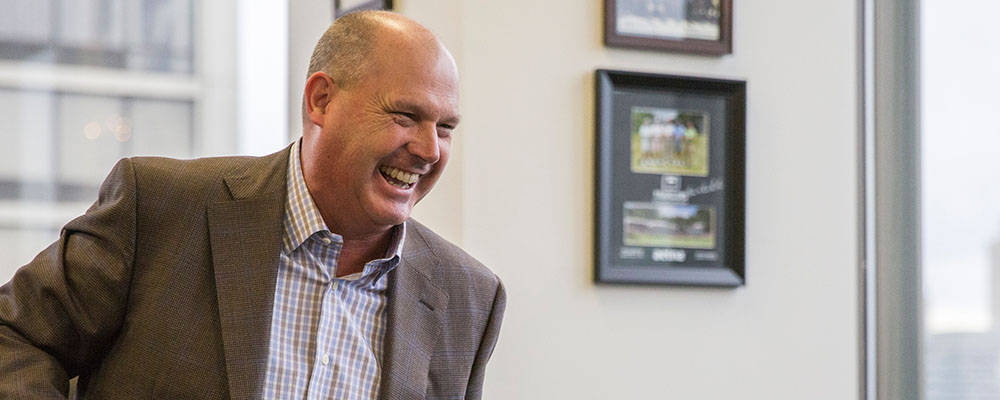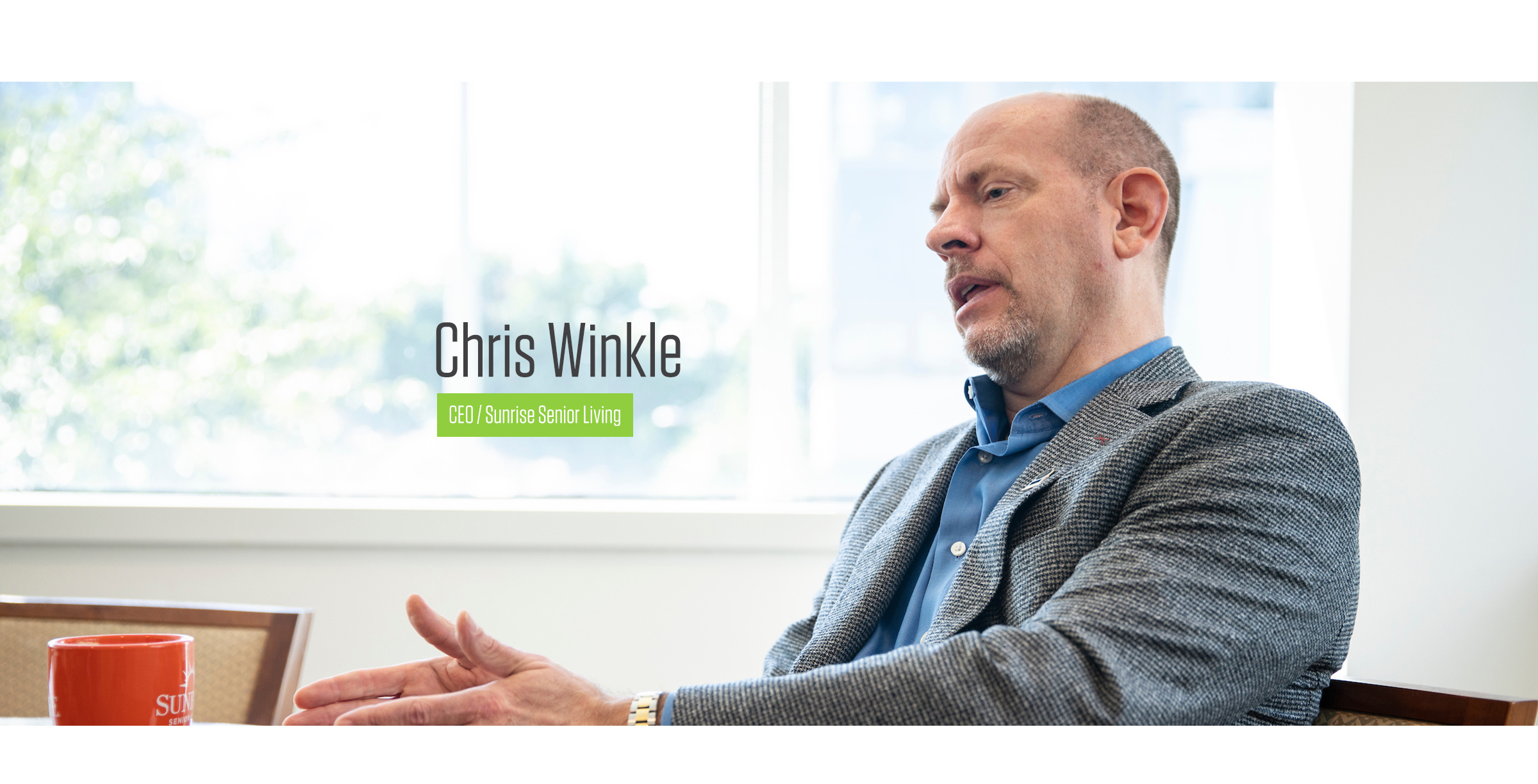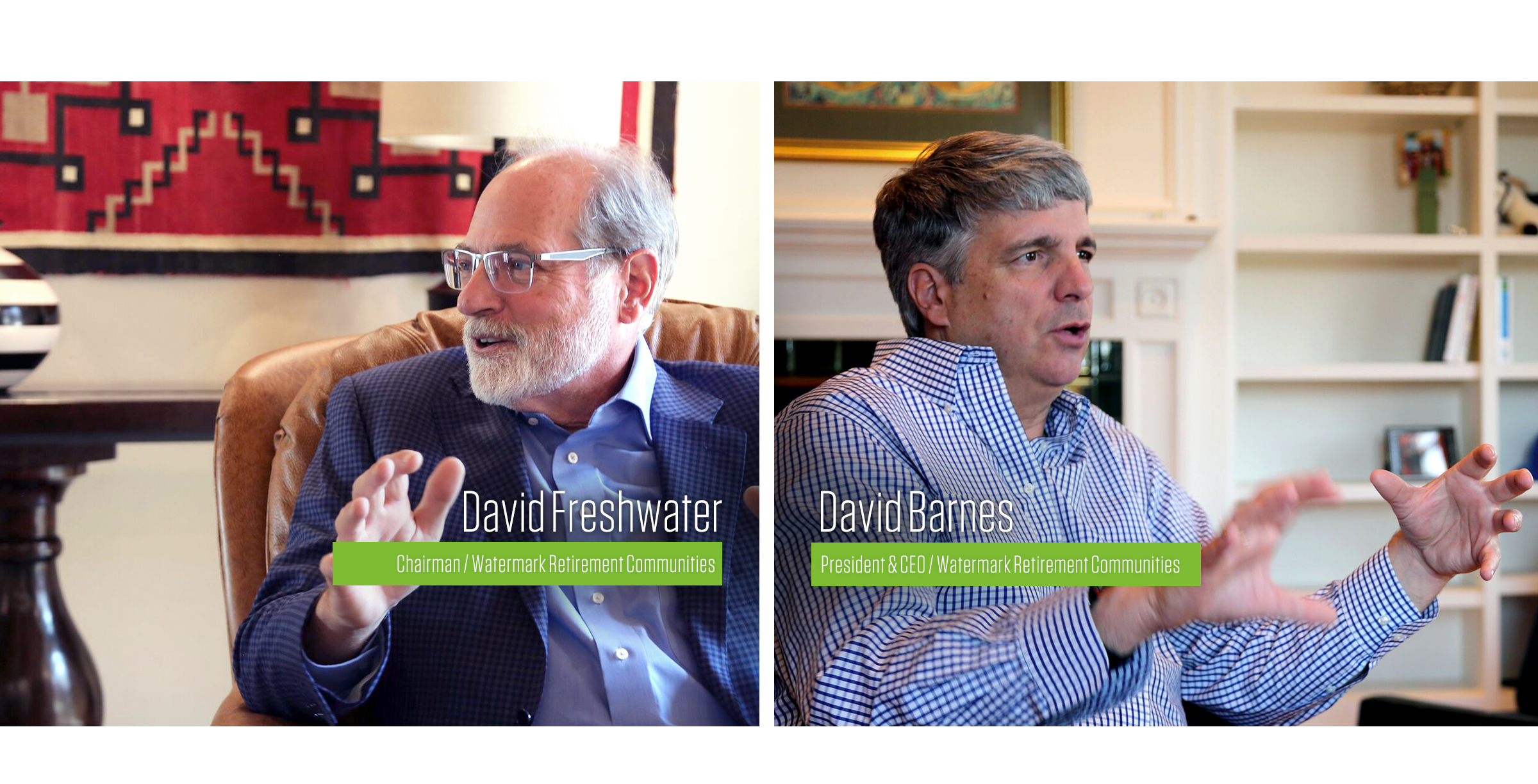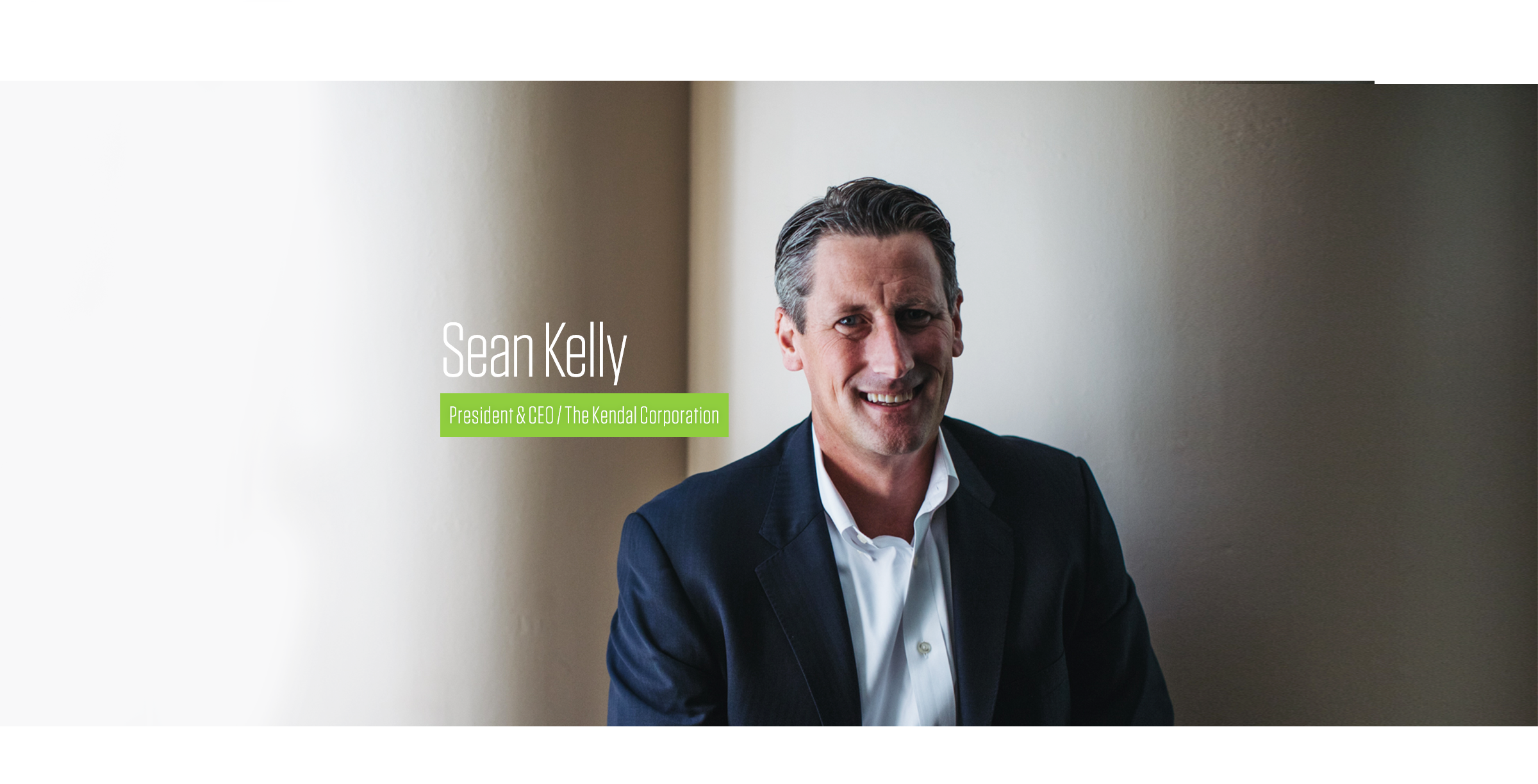Meet Jon DeLuca, president and CEO of Senior Lifestyle Corp. As someone who comes from outside the industry, DeLuca is considered a thought leader and innovator not only to the 179 communities he oversees, but to the industry as a whole. We sat down with Jon in his Chicago office to learn about where senior living can take a cue from the hotel business, why affordability will be the next big challenge, and how we can best develop the next generation of senior housing leaders.
What’s your definition of leadership?
There are a lot of definitions of leadership. In the broadest terms, you can define it as being able to lead your team to accomplish common goals, which is the way I define it. But I think what really drives leadership is ambition. Ambition drives other things, like passion and dedication and the ability to achieve and make it happen.
Would you consider yourself an ambitious person?
I don’t really think that you can get to this level without having some ambition. I equate ambition and ego differently, although I think at this level everybody has an ego. Don’t get me wrong—I think you can have less of an ego and still be effective. I try to be that. I have ambition, I want to do well, I want to drive, I want to have the performance, I want to have growth, I want to have my team excel and really set them up for success, but again, it’s more about them than me. That’s typically the way I like it.
Where do you think that ambition comes from?
I think it comes from where I came from. I grew up in Ft. Worth, Texas. I have three older sisters and a younger brother. I was the first one of my family to go to college. How that happened, I don’t know, but I think in high school I got on the right side of the tracks. From there I paid for my own school, I went to University of Texas at Arlington, and graduated with an accounting degree. From there, I went into public accounting and worked for Coopers and Lybrand for 10 years.
What did you see as the opportunity in senior living?
I actually received a cold call from a headhunter saying they had this company [Senior Lifestyle] in Chicago that was backed by the Whitehall Funds, which were part of Goldman Sachs, in the senior housing business and they were looking for a CFO. I said I didn’t know anything about it, but it sounded good because I was ready to try something different.
One thing led to another, and I was offered the job as CFO of Senior Lifestyle in 1998. The partnership we had with Whitehall dissolved, and I ended up with going with Whitehall and that’s when we created Horizon Bay. I was with Horizon Bay from 2001 until the end of 2010 as co-president and CFO. Then at the beginning of 2011, my current position as president and CEO of Senior Lifestyle came available. [Founder] Bill Kaplan and I had always stayed in contact and he called me. The timing seemed right because I wanted to do more, and Bill and I always had a great relationship. In 30 days here I was.
I started this current role back in the beginning of 2011, and we have accomplished a lot. Senior housing is a spectacular industry. It has changed a lot over the last 18 years. It’s really a very young industry still, but it’s coming out of the infancy stage; it’s kind of at the adolescence stage now. Things are starting to be more standardized and we’re starting to get more professional people involved in the industry, which is all positive.
What’s the best piece of advice you’ve gotten in your career?
I think the best advice I ever received is just be honest and always do what’s right. Just do what’s right.
“I don’t really think that you can get to this level without having some ambition. I equate ambition and ego differently, although I think at this level everybody has an ego.” – Jon DeLuca
What’s the biggest risk you’ve taken in your career?
It was a pretty big risk coming to Senior Lifestyle the first time.
Back in the late 90s there were a lot of owner/operated [properties]; people developing or acquiring two or three buildings, and managing it themselves. Most of the economics were in the real estate.
Over time, with the professionalism and the institutional capital coming in, it has made it harder for an entrepreneur to come into the space. With the cap rate compression, things are getting more expensive and it makes it harder for people to get into the business now. Institutional capital is a big player now, they have certain expectations, and if you don’t have the resources or the infrastructure, you can’t deliver what they need.
With the institutional capital coming in, is there still opportunity for the smaller operators?
I think there still may be some opportunities, but on a smaller scale. The industry is going to continue to see consolidation, and I don’t know if that’s a good thing or bad thing, but I do think that it will continue to consolidate.
I think it will become more like the hotel industry. So from the operator side, you’re going to have seven to eight, maybe nine large operators who will be managing most of the product, which will be owned by institutional capital.
So your Hyatts, Marriotts, etc.?
Yes, your Hyatt’s, your Marriott’s, your Westins, not to say that there still won’t be regional players or smaller players.
Kind of a boutique operator?
Yeah, kind of boutique operators. I think [boutique operators] will still exist but the majority of senior housing will be managed by more professional management companies. Today [less than half] of the product is managed by the [largest providers]. And [the majority] is still managed by the mom and pops. Over time, that changes, and I don’t know when that is it maybe 10 years from now or 20 years from now but it’ll change eventually to where you’ll have more professionally managed operators that will manage properties for institutional capital.
So I’ve been noticing a lot of books in here. So if you were going to recommend one book on leadership which would you recommend and why?
Most of the books I read now are on the sales side… How do you market yourself, how are you positioning yourself in the marketplace?
Like this one: “It’s not who you know it’s who knows you.” It’s all about getting yourself out there. I’m looking at a lot of these type of books now versus just the pure leadership [ones].
What made you change?
I just think that we need to have a big change in how we market ourself.
As a company or as an industry?
The company, but the industry overall, for sure. The industry is going to become more consumer driven. To date it’s always been: Here’s a box, you go live in it. The community has a theater, a dining room, big activity room, gym…but I think as we go forward we have to be more sensitive to what the actual consumer wants, and we need to start figuring that out because it’s going to be a game changer. Senior Lifestyle has launched a new brand for a new generation of seniors, The Sheridan. This brand is committed to listening and delivering on consumer wants.
Who do you consider to be your mentor and how have they helped your career?
From a personal level, my mother was my mentor. She was a hardworking woman, she raised five kids by herself and always worked. I mean she put values in me about hard work, do your best, and don’t worry things will pay off.
Business-wise I’ve had many. I am a strong believer in mentors and am proud of the strong mentor program we have developed at Senior Lifestyle.
What would you say some of your greatest strengths are as a leader?
Ambition. … [our employees] know that I will roll my sleeves up and get in the trenches with them, but I also provide guidance and expectations. When you put all of that all together, it’s pretty powerful.
What do you think your weaknesses are?
I’m too nice. My weaknesses are that I want people to do well. I probably had the string out too long sometimes.
You try to work with them a little longer than what you should, because you have that relationship, you want people to succeed and do well. Plus, it’s kind of a ding on me when people fail. At least I look at it that way. If I have someone that works for me that fails, it’s a failure on my part. What could I have done differently in order to make that person succeed?
Do you think you’ve gotten better over the years at finding the right people? What have you learned or what have you fine tuned?
Over the years, I’ve gotten better at interviewing people and really looking for the situational interview because so many times, at the level I’m interviewing people, let’s face it, they know the right thing to say. So what you have to do as an interviewer to really be effective, is you have to probe. So if they say something, tell me specifically what you did in that project, and tell me what your accountability was and what your contribution was. Then you’ll know right away if they’re just blowing smoke, or if they actually did what they said they did.
Do you have a favorite interview question?
That’s a good question. I had the most bizarre one asked of me: If I asked you to tell me how many golf balls you could put in an olympic-sized pool, how would you go about telling me what the answer is?
I don’t know, that’s tough. Sounds very Googl-ish.
Right? So there’s a couple of ways, right? You either take the volume of the ball and the volume of the pool so you can do the math, or you can go hire somebody to fill it up and tell you how many balls.
Which is the better answer?
I think it depends on the position. If you’re an analyst, you tell me the math. If you’re a manager, I probably want you to tell me to go hire somebody. It tells a lot about people, but it depends on the position. I think one of the questions I always ask is what has made you successful up to this point and why. That’s a very telling question sometimes.
The next generation of senior living leaders
Let’s talk about attracting people to the industry – which honestly I think for next year is going to be the biggest focus for everybody.
Again, like I said before, historically we’ve done a terrible job as an industry promoting ourselves.
I think people are starting to learn that if you want to be better than your competition, if you want to excel, you really have to spend the time investing in people.
“I think people are starting to learn that if you want to be better than your competition, if you want to excel, you really have to spend the time investing in people.” – Jon DeLuca
Then the question is: Do I want to invest in somebody who is bringing 20-year-old habits or do I want to go out and hire a business person and train them on senior housing. I think that’s where people are going.
We have a lot of good folks in this industry… but the business acumen sometimes is lacking. In order to be successful with the type of investors that we manage for now, whether it’s the private equity firms, the institutional capital, pension funds or some cases public and private REITs, there are certain expectations. We have to do a better job because this industry is going to be among the hottest industries for the next 15 years and then it really takes off.
But if you look at the demographics, there’s going to be a huge shortage of workers. Given the shortage, we have to be smart and start developing tactics to let people know that there are real career paths in this industry. At Senior Lifestyle, we are changing the way we recruit with an online education and marketing strategy. We also believe the best thing we can do is to invest in our people, and we have developed a strong career path plan for employees ready for the next step.
If I’m about to graduate college, what’s your pitch to me on why I should look at senior living as a career?
If you look at the fastest growing industries over the next 15 years, senior housing is going to be one of them, and there’s a tremendous amount of opportunity.
Not only from the management side, finance, acquisitions and development, asset management, human resources and accounting opportunities, but there are also opportunities on the community side where you can run a pretty sizable business. On the smaller side you can build a 100-unit community for $25-$28 million dollars, it’s a lot of money. And if you’re running the community, it’s a nice business. It’s a lot of work, but if you have the right frame of mind and skill-set you can excel in this business.
If you’re 25 years old do you want to be an executive director? Can you be?
You can be. We’ll teach you the senior housing. Here’s what I tell people, if I had $25 million in cash and put it on the table, am I going to pay someone $50,000 to manage it for me?
No way.
Exactly. That’s what the industry has done historically. I’ve got to attract somebody who knows how to manage a business.
Do you pay your executive directors more than that?
We pay a competitive salary, but that has gotten there over time. If you’re going to have someone in charge of a $25 million – $50 million asset, you want a business person! Which is OK, because we can teach them the senior housing business. We have outstanding Executive Directors and they do a great job for us.
Do you think the industry does a good job taking those people that could go to the next level?
Yes and no. In the past, it’s always been about promoting [a good] person to a regional position, because they’re good at what they do, but to be a regional and to be effective, it’s a whole different skill set. Some succeeded and some didn’t because they didn’t have the right skillset for that new position.
We are trying to be more selective and identify candidates we think can make it at the next level. We need to make the investment in our employees and give them all of the resources to be successful.
What about developing the next generation of leaders, is the industry doing a good job developing those people?
I think we’re starting to. NIC, Argentum, and ASHA are doing some good things. NIC has the future leaders council and we’ve had several of our people go through it. I am a board member of Argentum and Argentum is now working on some really cool things on credentialing, which again goes back to the career path [topic]. This would be a certified credential, similar to a CPA exam or Bar exam. It would be externally administered. I think that would help set people apart. …That should be available at the end of next year.
Is it an easier sell today to get someone to jump over from another industry because of the ways senior housing has matured and the presence of institutional investors? Do you think it’s become more exciting?
I think the way senior housing went through the last recession helps. We fell, but we didn’t fall as hard as some other [industries] and I think that should be an attraction. But with that said, I think the other thing that’s exciting about getting into senior housing it’s not just the traditional community. If we want to be successful, we have to figure out how to go into other lines of business, whether that’s home health care, therapy, hospice, whatever it is, because our biggest competition is technology.
One thing that you started talking about was the affordability, you seem concerned?
We can continue to play in the private market area but that’s a very small percentage of people and if you look at the numbers coming through, I think affordability is going to be a huge issue.
What the industry needs to figure out is how do you build an affordable product for people? There’s going to be a huge market for it if you can figure it out. The industry continues to focus on private pay residents who represent only the top tier of the market.
So is that part of the reason why you have two brands? The higher end brand, and I don’t want to say affordable, but how would you describe it?
We have the Signature Collection, which is our very high end product… and our other model is called the Sheridan, which is still a very nice product, and then we have another product called the Senior Suites, which is affordable. I think we need to be selective and choose where you want to play and those are our development opportunities. From the acquisition side we have pretty much everything, which I think can be challenging at times, but also makes us better because we have to understand how we really operate.









